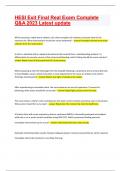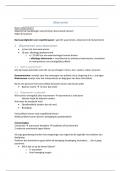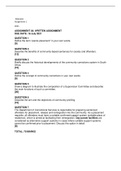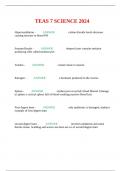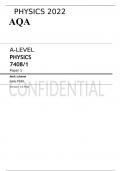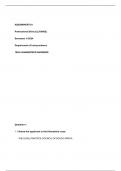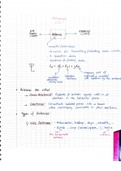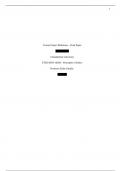GRADE 10-12 NOTES
, lOMoARcPSD|17316368
Table of Contents
PAPER 1........................................................................................................................................................................................2
..............................................................................................................................................................................................2
QUESTION 1 - COMPREHENSION................................................................................................................................................2
MARK ALLOCATION......................................................................................................................................................................4
TYPE OF QUESTIONS............................................................................................................................................................8
INSTRUCTIONS WORDS..............................................................................................................................................................18
SUMMARY WRITING..................................................................................................................................................................20
SUMMARY RUBRIC.............................................................................................................................................................22
QUESTION 5– VISUAL LITERACY.................................................................................................................................................24
5.1 ADVERTISING...................................................................................................................................................................24
5.2 CARTOONS.......................................................................................................................................................................33
UNSEEN POETRY QUESTION 4...................................................................................................................................................35
SIMILICF RULE (POETRY SKILLS).........................................................................................................................................35
Comparison between poems.............................................................................................................................................36
Types o f questions............................................................................................................................................................37
QUESTION 6 – TEXTUAL EDITING...............................................................................................................................................38
Textual editing terms include............................................................................................................................................38
Don’t forget to check the notes for english skills paper 2 IEB...........................................................................................39
1
, lOMoARcPSD|17316368
PAPER 1
The aim of this teaching aid is to show the learner that any question in Paper 1 analysis
of paper 1 s accessible and that they should not feel intimidated by the text or the
instructional verbs. learners must be encouraged to practice as many past papers as
possible, prior to the exam, to ensure that they are fully prepared. It is possible to score
marks in this paper if you study!
QUESTION 1 - COMPREHENSION
Understanding question levels and how to answer them:
1. General comprehenshion questions testing understanding of the text
a. E.g Account for the writer’s feelings in paragraph 1
2. Vocabulary type questions tests wor meaning
a. E.g. Explain what the writer means by, ‘The young men and women seem lost in
the designer clothes, dwarfed and dehumanised by their possessions, as if
ownership has gone into reverse.”
3. Technical type questions test the sytle,presentation ,construction or grammar of
the text
a. Eg Explain the writers purpse in referring to various research findings
4.
2
, lOMoARcPSD|17316368
Phrases that may be use to respond to the question.
INCLUDED IN THE QUESTION POSSIBLE RESPONSES
Add creditability ,validity,
Use of statistics or numbers / direct authenticity, provokes an
speech emotional response to convince,
manipulative, persuade
Involves/engages the reader
Reference to the grammar or style e.g.
personally (colloquial language,
Use of formal / conversational
informal) add credibility, validity,
language, slang, personal pronouns (‘i’,
authenticity (formal writing)
‘you’, ‘we’) choice of diction use of
provokes an emotional response
punctuation use of hyperbole rhetorical
(emotive words) adds
questions use of repetition
authenticity to reach a possible
solution
Emphasizes / highlights the
Short paragraphs or single sentence writer’s point / message evokes a
response adds impact
Emphasizes/highlights (the
Use of figurative language e.g. Imagery,
writers message)engages the
simile / metaphor/ alliteration
reader
3
, lOMoARcPSD|17316368
MARK ALLOCATION
A name or heading under which something is classified: an
explanation or a set of instructions at the beginning of a book, a test,
etc. Use rubrics to guide you of what to do when answering the
test.
DESCRIPTORS FOR EVALUATING RESPONSES DETERMINED BY MARK ALLOCATION AND
COGNITIVE SKILL
A 5-mark question that requires extended abstract thinking.
The response demonstrates understanding, application, analysis,
complex inference and/or synthesis, evaluation or appreciation.
Marks Skills
5 The excellent response:
• is complete and detailed, making specific reference
to more than one element of the required text(s)
• makes insightful links between the question and the
text(s)
• provides evidence that understanding can be
transferred to a new contexts
• integrates all elements, making connections and
demonstrating a clear understanding of how the
parts contribute to the whole
4–4½ The very good response:
• makes specific reference to the required text(s)
• makes accurate links between the question and the
text(s)
• provides evidence that understanding can be
applied to familiar contexts
• integrates the key elements, making
connections and demonstrating a clear
understanding of how the parts contribute to the
whole
3–3½ The average response:
• refers to the required text(s) in a general way
without addressing all aspects
• makes simple, underdeveloped links between the
question and the
text(s)
• could be complete, without the required references
4
, lOMoARcPSD|17316368
or evidence
• does not demonstrate an understanding of the
significance of the whole determined (does not
clarify/ establish the significance of the whole)
2–2½ The incomplete response:
• refers to the text(s) in a general way
• is inaccurate or simplistic
• demonstrates concrete thinking and an incomplete
understanding of the elements
0–1½ The inadequate response:
• refers to the text(s)
• does not answer the question because of a lack of
understanding
A 4 mark question that requires relational thinking.
Demonstrates understanding, application, analysis, complex
inference or synthesis.
This answer could require evaluation or appreciation.
Marks Skills
4 The excellent response:
• is complete, addressing all aspects of the question
and drawing them together accurately
• links all the ideas and provides the required
evidence
• demonstrates understanding applied to familiar
contexts
• integrates all elements, making connections and
demonstrating a clear understanding of how the
parts contribute to the whole
3–3½ The good response:
• shows that the significance of each element is
understood, but an aspect of the answer is not
clearly explained
or
• addresses each element, but does not successfully
link them
• is not entirely convincing and/ or does not convey a
clear understanding of how the parts contribute to
the whole
2½ The average response:
• is multi-structural, but addresses the elements in an
incomplete or flawed way
5
, lOMoARcPSD|17316368
• does not link elements or does not demonstrate an
understanding of the significance of the elements
• omits or misunderstands a key element
2 The incomplete response:
• is one-dimensional, omitting more than one element
• indicates a flawed understanding of the question
and/or the text
0–1½ The inadequate response:
• attempts to address aspects of the question, but
indicates only partial understanding
A 3 mark question that requires multi-structural thinking.
Demonstrates understanding, application, analysis, inferential
comprehension of implied and figurative meanings
Marks Skills
3 The excellent response:
• engages with all aspects of the question and
provides the required evidence
• indicates a clear understanding of the significance
of each element
2½ The good response:
• is multi-structural, but not integrated or
• is convincing but incomplete
• provides evidence if required
2 The average response:
• is either one-dimensional, without sufficient
evidence, or is superficial and general
• does not provide enough relevant justification
• demonstrates that the candidate understands the
issue
1½ The incomplete response:
• demonstrates a flawed or incomplete understanding
6
, lOMoARcPSD|17316368
of what has been asked
• indicates an understanding of the text
• attempts to use the text to answer the question, but
reasoning is concrete or simplistic
0–1 The inadequate response:
• indicates only partial understanding of this aspect of the
text
A 2 mark question that requires uni-structural thinking.
Demonstrates understanding and application, literal
comprehension and reorganisation
Marks Skills
2 The excellent response:
• is complete and accurate
1½ The good response:
• is partially complete
and accurate or
• is complete and
mostly accurate
0–1 The incomplete response:
• is inaccurate or only includes one half of the required
response
7
, lOMoARcPSD|17316368
TYPE OF QUESTIONS
QUESTION 1.1
Account for the writer’s feelings in paragraph 1.
Answer: Note that this question is a
The writer is disgusted by/pities (writer’s comprehension-type question
feelings) the flashy/obscene displays of and an accessible one as you
wealth by spoilt teenagers (account for his
merely have to “rephrase” the
feelings).
revulsion = disgusted existing words in the paragraph.
by i.e. “that inspires more than the
crude displays of opulence = usual revulsion towards crude
flashy displays of wealth displays of opulence” .
Give reasons for your answer
QUESTION 1.2
Explain what the writer means by, ‘The young men and women seem lost in
the designer clothes, dwarfed and dehumanised by their possessions, as if
ownership has gone into reverse.” (2)
Answer: 1. Explain
The possessions seem to own the person, 2. Quote
who has been dwarfed; the youth have 3. Explain
become less human, ‘dehumanised’ by their
possessions, as ownership has been
reversed.
QUESTION 1.3
Discuss the point the writer is making in lines 14 – 15: ‘a photograph whose
purpose is to
Illustrate plenty seems instead to depict a void.’
Answer: Always use
It is ironic that POINT while these young ‘BUT’/’HOWEVER’/’ALTHOUGH’ when
people intending flaunting their abundant answering a question with IRONY!
possessions, EVIDENCE they actually When referring to an irony
reveal how empty their lives are. question explain two opposites.
One thing was said but the
opposite was implied. One thing
happened but the opposite was
expected.
8
, lOMoARcPSD|17316368
QUESTION 1.4
Refer to paragraphs 3, 4 and 5. Explain the writer’s purpose in referring to
various research findings.
Answer: This is a TECHNICAL TYPE QUESTION.
The writer wishes to provide convincing Whenever you see a question like
evidence to support his view/ validate/ add this, you can offer the same TYPE of
credibility to his argument. response. Practise this with past
papers.
QUESTION 1.5
Explain why, in your view, does the writer distinguish between ‘consumers’
and ‘citizens’ (line 38)?
Answer: In QUESTION 1.5, many
A negative connotation is attached to the candidates did not provide the
word ‘consumers’, who are viewed as those reasons for the writer’s use of
who purchase goods without discernment.
the two distinct concepts,
They are self-absorbed individuals (’more
competitive and more selfish’) who do not ‘consumers’ and ‘citizens’;
engage with others and lack ‘social instead they focused on defining
responsibility’. ‘Citizens’ carries a positive the two terms. Further, this
connotation; they would be discerning and question requires an analysis of
add value to society. DICTION – see the underlined
Award 3 marks only if both concepts have parts of the answer. NOTE: The
been addressed.
question did not ask you to
DEFINE the terms! To ‘distinguish
between’ is to differentiate or tell
apart.
In your view meaning it’s an
opinion question need to be very
specific with the answer
9

